Articles
Eliezer ben Yehuda: The Secret to His Success
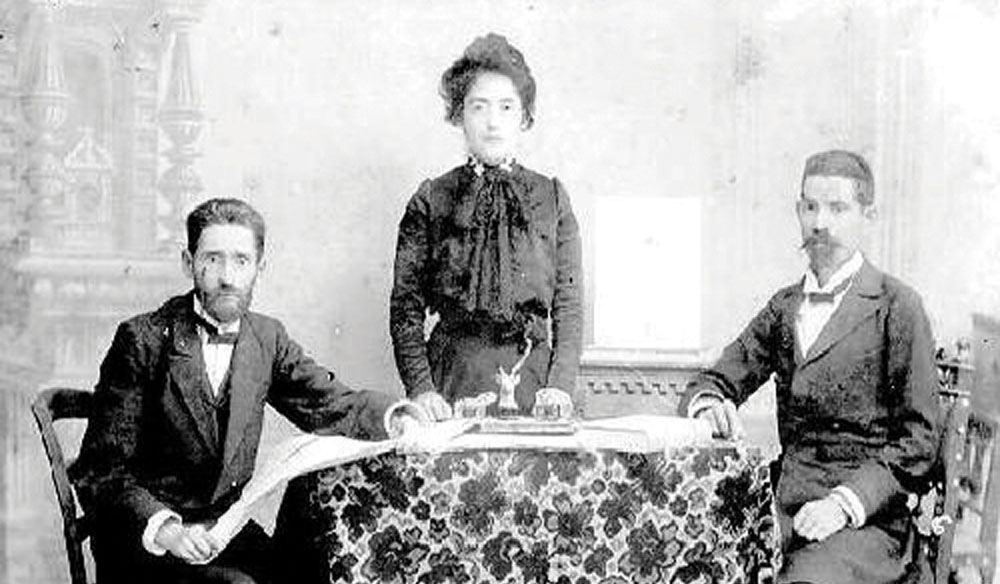
From left: Eliezer, wife Hemda, David Judelovitch, a former student of Eliezer who became one of the leading educators bringing Hebrew to the schools of the settlements.
By Shira Sorko-Ram
As the Great War spread to Palestine in 1914, the Ottoman Turks looked for spies and informers among the Jews of Jerusalem and the settlements. They saw Zionism as an enemy and Ben Yehuda was obviously at the top of their list. In fact, if it had not been for a bribe from the philanthropist Baron Rothschild eleven years before, Ben Yehuda would have been hung for treason. His son, Ben Zion, who had changed his journalistic name to Itamar Ben Avi, discreetly closed down their family newspaper as rumors spread that he might be executed as a traitor.
As the war continued, the Turks demolished the Jewish settlements, taking their animals and tools, cutting down the trees planted by the pioneers and destroying their crops. For Ben Yehuda, his dreams were crashing. For whole days he would not eat.
His wife Hemda was terrified that some Turkish officer might confiscate the manuscripts and notes for the remaining volumes of his dictionary, so she secretly took them to the American consul, who assured her they would be as safe as if in a vault in New York.
With no charity arriving for the ultra-Orthodox Jews and no banks open, famine and poverty, followed by epidemics such as typhus, infested the land. Incredibly, at the same time, a terrible plague of locusts covered the country, devouring what few crops were left.
Hemda was so worried for Eliezer’s health and safety that she suggested they leave for America during the war. In the mayhem of Jerusalem, he had simply stopped working on his dictionary. In New York, Hemda explained, he could work on his dictionary in peace. But Ben Yehuda would hear none of it. He would stay with his people, especially in the current dire circumstances.
However, other Zionist leaders in the country were also worried about him and saw no reason to endanger the life of a national treasure. So they decided, together with Hemda, to officially appoint him to travel to the United States for the critically important mission of persuading the American Jewish community to stand with Britain, and not Germany, in the war.
Most Jews in Palestine hoped Britain would ultimately win the war, but they needed America. If, God forbid, Germany were to win, its ally, the Ottoman Turks would also win, resulting in the end of the Zionist dream for Jews to have their own nation in ancient Israel.
TURKS REFUSE BEN YEHUDA’S EXIT PERMIT
Finally, Ben Yehuda reluctantly agreed to go to America. But the challenge now became, how could he and his family sneak out of the country? Everyone knew the Turks, for their own reasons, would not allow him to leave. Nevertheless, they headed for Jaffa in the dead of night to take a boat. But the ultra-Orthodox reported their escape to the Turks who caught them when they were already on a barge heading for an offshore ship. On the second attempt the Ottoman military commander in the Haifa bay stamped Eliezer’s permit, “Dangerous Journalist, not permitted to leave from any Palestine Port!” and sent them packing back to Jerusalem.
The third time, two of Eliezer’s close Arab friends took the military commander out for a long, lazy supper while the wanted man and his family hopped on a boat half full of Jaffa oranges. It was only half full because the Jewish farmer thought it more important to get Ben Yehuda out of the country than to sell his oranges—an enormous economic sacrifice in those difficult days.
MEETING FEDERATION OF AMERICAN ZIONISTS
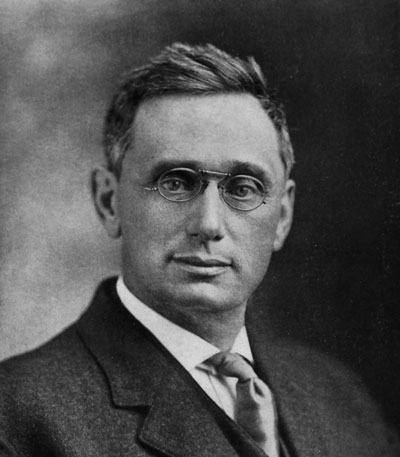
U.S. Supreme Court Judge Dr. Louis Brandeis
In America, Ben Yehuda was wined and dined like never before in his life. Many renowned Jews already knew Eliezer and Hemda, because distinguished scholars and politicians and leaders from around the world continually passed through Ben Yehuda’s Jerusalem home. So upon their arrival in the U.S., a large reception was arranged for Ben Yehuda to make a speech.
His passion and clarity of the dangers, challenges and possibilities for the Jews of the Land of Israel won the day. He pressed hard: “We Jews,” he said, “must show ourselves worthy to be entrusted with our own destiny.” In attendance was Dr. Louis Brandeis, confidante to President Woodrow Wilson and the first Jew to ever serve on the U.S. Supreme Court. He asked Eliezer to give the same speech to America’s premiere Jewish leaders sympathetic to Zionism. Three days later, these leaders declared themselves on the side of the Allies—an incredibly important win, which ultimately helped lead the United States to join the Allies.
FOUR YEARS OF CONCENTRATED WORK ON DICTIONARY
The affluent U.S. Ambassador for the Ottoman Empire, Henry Morgenthau, arranged a home for the Ben Yehuda’s and a special room in the New York Public Library with all the books he needed to work on his dictionary. From 9:00am – 6:00pm, Eliezer was able to work, non-stop, with no worry of food or shelter, and no harassing Orthodox or Turks at his door. Even though his previous notes were stashed away in the American Consulate in Jerusalem, he was able to complete most of his research for the remaining letters of the alphabet!
A massive celebration at Carnegie Hall was organized for Eliezer’s 60th birthday. He was praised by one speaker after another—likening him to the prophets of ancient Israel, who were often unpopular, but always true to their calling. And to top it off, America’s Jewish community gave them the princely sum of $10,000 to build their own home in Jerusalem!
BRANDEIS SPEAKS WITH PRESIDENT ABOUT ISRAEL
But Ben Yehuda knew he had one more task to fulfill. He must take advantage of his friendship with Judge Brandeis while he had the opportunity and implore him to use all his influence to convince President Wilson to recognize the legitimate rights of the Jews to a national life in their ancient homeland. Unsure, Brandeis asked Ben Yehuda if he actually thought Palestine’s Jewish community had enough of an infrastructure to actually establish a sovereign state.
Ben Yehuda answered, “Absolutely!” He explained that there was a vibrant generation of both young immigrants and those already born in the land. And he introduced his son, Ben Zion, who was immediately scooped up to be a spokesman for Israel to Jewish groups across America. So Brandeis opened up the subject with the president who was also quite incredulous about the viability of a Jewish state. Brandeis repeated what Ben Yehuda had told him—especially of the capable new generation of native Jews born and raised in Israel—referencing Ben Zion as an example.
BILLY SUNDAY AND BENNY SATURDAY
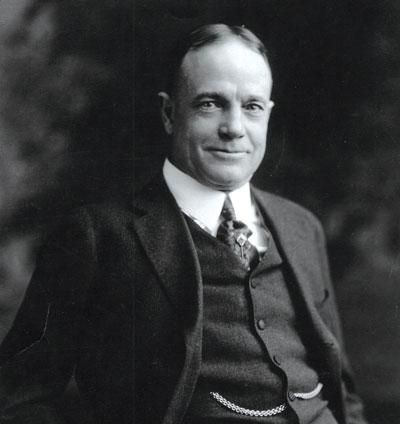
Evangelist Billy Sunday
For the strangest of reasons, President Wilson thought about Billy Sunday, the great American evangelist who happened to be in Washington, D.C. at that very moment, preaching the Gospel. Wilson told Brandeis if he could get Ben Zion on the stage to talk about Israel from a Biblical standpoint, the president would send him as a delegate to a conference to sort out the boundaries of nations after the terrible war. It happened! Billy Sunday, giving the stage to the young man from Jerusalem, said, “Here is a true Israelite from the land of the Bible! Won’t you welcome—Benny Saturday!”
Billy Sunday gave him a big hug, patted his back vigorously, and said, “Ben, tell them the truth!” Ben Zion quoted Ezekiel 37, and told his huge Christian audience that God was raising up from the dead a new revived nation of Jews in the Holy Land. The crowd roared its approval and shouted “Benny Saturday! Benny Saturday!”
And that is how Ben Zion, whose name was now Itamar Ben-Avi, became a representative of the Jewish Zionist movement sent by President Wilson to the Conference of Small Nations at the Paris Peace Conference.
Most importantly, 21,000 Christians at Billy Sunday’s tent meeting saw with their own eyes, the resurrection of the Jewish people as told by Ben Yehuda’s son, “the first Hebrew child,” some 30 years before the state was born.
THE BIRTH OF THE BALFOUR DECLARATION
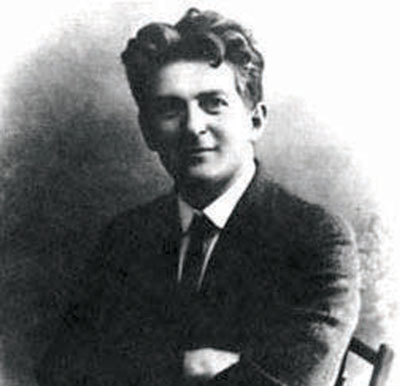
Itamar Ben Avi – originally Ben Zion Ben Yehuda
Nevertheless, momentum was building for the establishment of a Jewish state. England was winning the war. There were a number of Christian men in the British cabinet sympathetic to the Jewish people. Lord Balfour asked President Woodrow Wilson his thoughts concerning a Jewish state. Wilson was favorable. On November 2, 1917, Balfour announced that the government of Britain looked with favor on the establishment of “a national home for the Jewish people.”
Ben Yehuda, though still in the U.S. was ecstatic! He responded with a paraphrase of Psalm 126: “T’was like a dream when the Lord restored Zion from its bondage.”
Just two months later, the Turks surrendered the city of Jerusalem to the devout Christian, General Edmund Allenby.
GOING HOME
Ben Yehuda wanted one thing and one thing only—to go home. But it was several months before they could find passage on any ship. Hundreds saw him off at the New York pier.
When their ship arrived in Egypt, they took a train to the Palestinian border. At the front, the new British governor came to greet Ben Yehuda with an outstretched hand, saying with a broad smile on his face, “Shalom alechem [Peace be unto you]!” With all his visionary dreams, Eliezer never imagined a British authority would greet him in Hebrew!
Back in Jerusalem, reality hit. People wouldn’t speak to him because he had “fled” during the war. His house had been stripped because his secretary had sold furniture for himself and his family to survive. Only Eliezer’s library had not been touched as it had remained locked. But all the other rooms were filled with squatters, and it took a court case to get them out. Most important, his dictionary manuscripts were safely retrieved from the American Consulate.
SAN REMO—ONE OF THE MOST IMPORTANT DOCUMENTS EVER
But one of the greatest events of Eliezer’s entire life was about to unfold—the convening of the San Remo Conference. Although much less recognized and celebrated today than the Balfour Declaration, San Remo was far more important. True, the Balfour Declaration was the first public statement of support for the idea of establishing a national homeland for the Jewish people. But now 52 nations were gathered together to discuss the division of lands according to winners and losers.
The Jews of Palestine were interested in one thing. What was San Remo doing about a Jewish state? Again, Eliezer wasn’t able to eat, sleep or stand still. Not even to work on his dictionary. Then one morning Itamar came running into the house with a cable and announced that 52 nations had unanimously approved a British mandate over Palestine—to be governed along the principles set forth in the Balfour Declaration!!!
“I HAVE ACCOMPLISHED MY PURPOSE”
Eliezer could not contain his joy. According to his grandson’s book, Fulfillment of Prophecy by Eliezer Ben Yehuda II, he felt this was all the fulfillment of prophecy. The Messianic days were at hand. He exclaimed, “Now I have accomplished the purpose of my life, and I can die peacefully!”
The San Remo Resolution of April 1920, was certainly much more important than the Balfour Declaration in terms of international law. Think of it! Fifty two states ratified the Balfour Declaration and mandated that Britain prepare the way for a Jewish state. Moreover, on July 24, 1922, the League of Nations ratified the San Remo Declaration!
HEBREW BECOMES AN OFFICIAL LANGUAGE
Miracles continued to happen. Great Britain appointed Sir Herbert Samuels, a Jew, to be the British High Commissioner of the British Mandate. Soon after he arrived, Samuels invited Eliezer and Hemda to be his official guests for Sabbath services and lunch. He asked Ben Yehuda if he would teach him and his children Hebrew! It was then Samuels revealed he would officially announce that Hebrew would be one of the three legal languages of his government, along with English and Arabic. It happened on June 11, 1920. Eliezer’s joy knew no end.
Samuels did warn Ben Yehuda that now he would have to quickly come up with a whole lot of new words—like hospitals, health clinics, wire service, coffee shops, restaurants, and various government agencies. These were glorious days for Eliezer! Many of Palestine’s Jews were convinced their rebirthed nation was just around the corner.
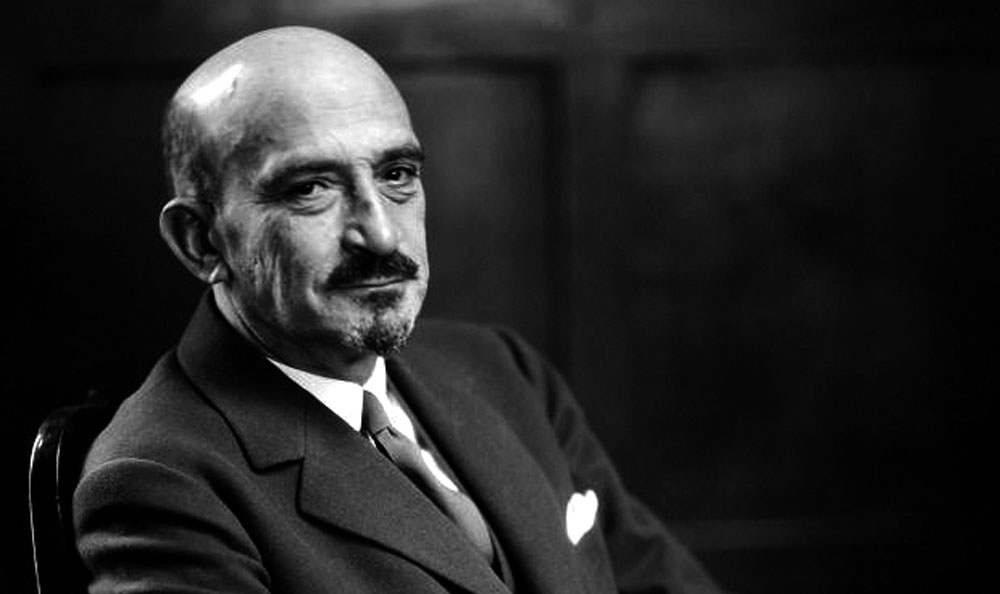
Dr. Chaim Weizmann, last person to visit Ben Yehuda as they discussed how to urge Jews to immigrate to the Land of Israel. He became the State of Israel’s first President.
ARAB VIOLENCE AND THE “WHITE PAPER”
But there were yet many challenges for the Jews of Palestine before that day would come. During Samuel’s five years of service, Arab violence and out-of-control riots convinced British Prime Minister Winston Churchill to deliver his tragic “White Paper” on June 3, 1922, declaring that over the next five years, only 75,000 Jews could immigrate to the Holy Land and after that, none would be permitted.
This was terrible news. Chaim Weizmann, the famous chemist who had a great influence on the creation of the Balfour Declaration. went to Israel and realized the Jews were not taking advantage of this small window of opportunity to immigrate to Israel. Jews were not immigrating for fear of the Arab riots.
Weizmann met with Ben Yehuda for several hours. He pleaded with Eliezer to write another clarion call for Jews to come home. No one but Ben Yehuda could pen such a passionate plea and this call was extremely urgent. “The time to come is NOW!” Weizmann implored. “The gates are open, and our people are not coming back. This is an opportune moment that will not last.”
Ben Yehuda was worn out. He was coughing constantly, and each bloody cough further weakened him. But when Weizmann insisted, Ben Yehuda answered, “You are the leader. Your wish is a command. I shall write it for you.”
For three days, Ben Yehuda tried to write an article. But it wouldn’t come. His mind was blank. Hemda came to his study at midnight and told him he could write the next day, but now he must sleep. He lay down on a nearby couch. But in a short while, he called Hemda. He was having trouble breathing. The call for help was instant, and soon five doctors were caring for him while the children gathered around. He was given oxygen and for a minute his eyes brightened and he said in Hebrew, “I believe!” He sank back onto the couch where he was resting. In a few minutes he was gone. It was December 16, 1922. He was 64 years old.
FIRST STATE FUNERAL OF JEWISH “NATION”
Suddenly his greatness was recognized! At his funeral, 30,000 Jews and Arabs followed the procession to his grave on the Mount of Olives. Settlers from around the entire country came—even the ultra-Orthodox. It was truly the first state funeral of the Jewish nation! Palestine was ordered to observe three days of national mourning.
The Jews of Palestine would have to wait another quarter century to see their nation birthed. But all the schools in Palestine were already teaching in Hebrew. Eliezer and Hemda had produced five volumes of his dictionary. And he had prepared the material for another eleven volumes. The courts, the theater, business, society and public affairs were being conducted in Hebrew in the Jewish community.
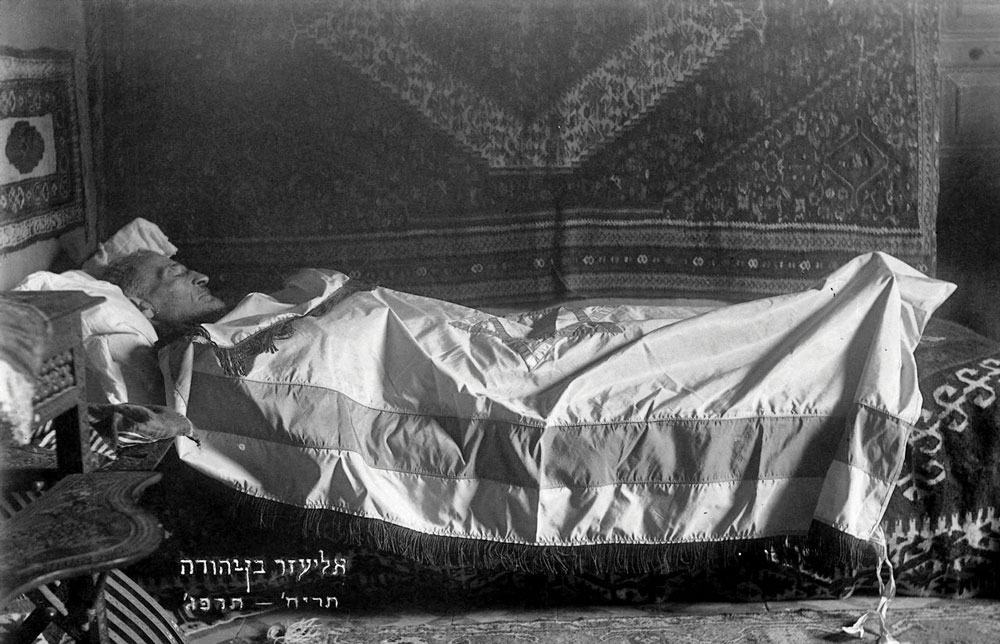
Eliezer Ben Yehuda, 1858-1922. The night of his death, Hemda covered him with a flag containing the Star of David, given to him by the American Jewish community during his four-year “exile” from Jerusalem.
WHAT WAS HIS SECRET?
Eliezer Ben Yehuda lived 41 years with deadly tuberculosis that even killed Devora, his first wife of only 10 years, from that same disease. Three of his children died a couple of months later from a pandemic attack of flu. He lost two more children through disease from his second wife, Hemda. The ultra-Orthodox and the Ottoman Turkish authorities made his life hell. After ten years of blood, sweat and tears in Jerusalem, very few Jews spoke Hebrew as their mother tongue.
He lived through setback after setback trying to create a Hebrew dictionary for his Jewish people. He and his family lived in abject poverty and want, except for the last seven years of his life. All this gives just a glimpse of his struggles and disappointments.
What gave him the ability to survive and succeed facing such crushing misfortunes? What drove this man to such heroic heights?
The vision. It was the vision.
He shared the answer with his family years before:
“I had a vision, and in my vision I was removed from Eastern Europe from the cold misery of the winter and passed onto the passage of the Jordan by Jericho where the children of Israel passed over. I was walking towards the water and a voice sounded in my ears and it said, ‘The redemption of Israel is in its land and its language!’”
Who could have given him this vision but God?
Principle Sources: Fulfillment of Prophecy, Eliezer Ben Yehuda, by Eliezer Ben Yehuda (grandson) 2008; Tongue of the Prophets, The Life Story of Eliezer Ben Yehuda by Robert St. John 1952; https://goo.gl/MVmMUK; https://goo.gl/8r29uN
About the Author

Ari and Shira Sorko-Ram are the founders of Maoz Israel Ministries. The mission of MAOZ is: 1) To declare the Message of Messiah and make disciples in the city of Tel Aviv and throughout Israel. 2) To raise up Israeli leaders to prepare for the coming spiritual awakening among the people of Israel. 3) To educate and inform Christians world-wide of the strategic importance of Israel and the Jewish people in God’s plan for world revival. The MAOZ web site is www.maozisrael.org.